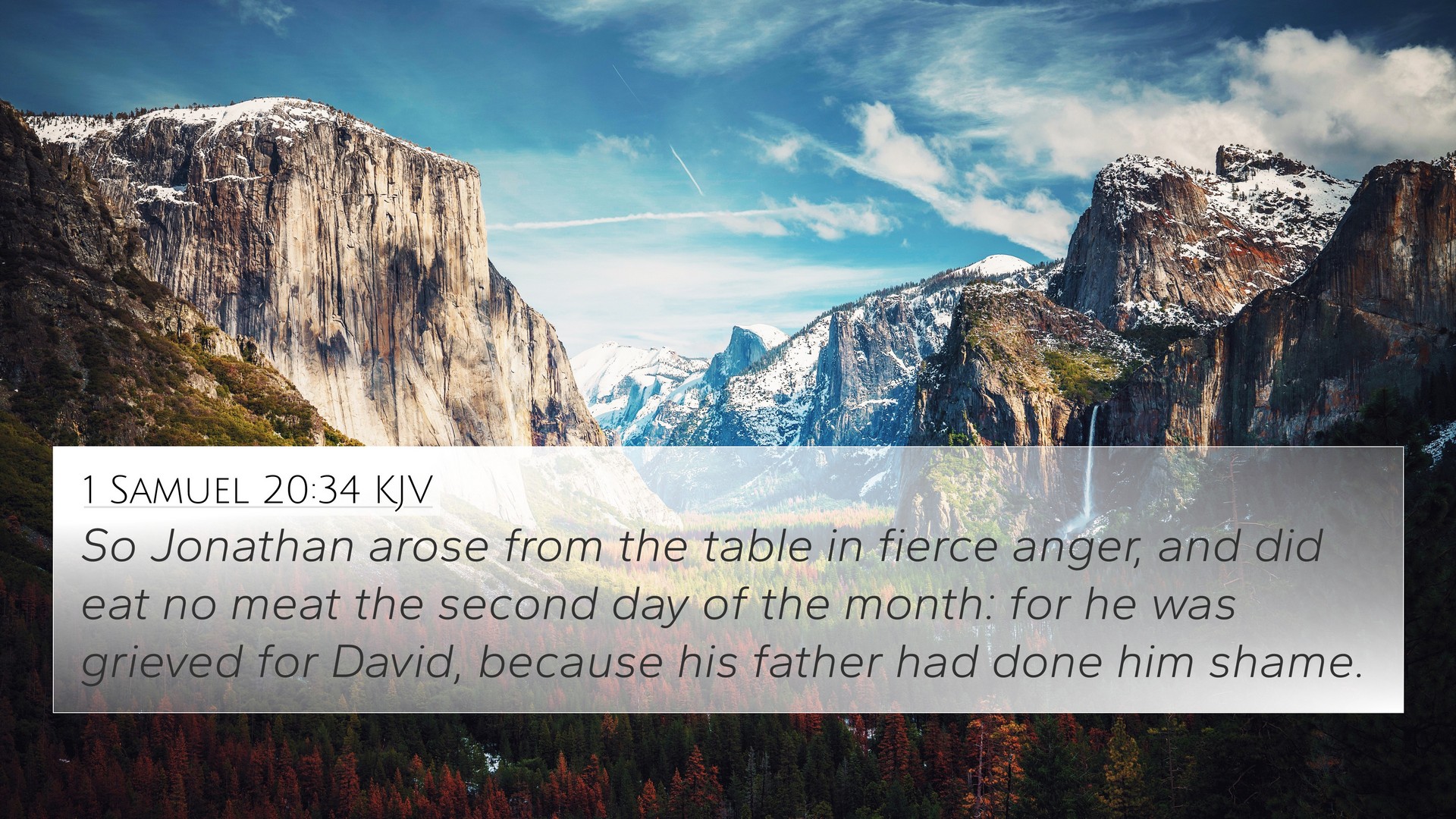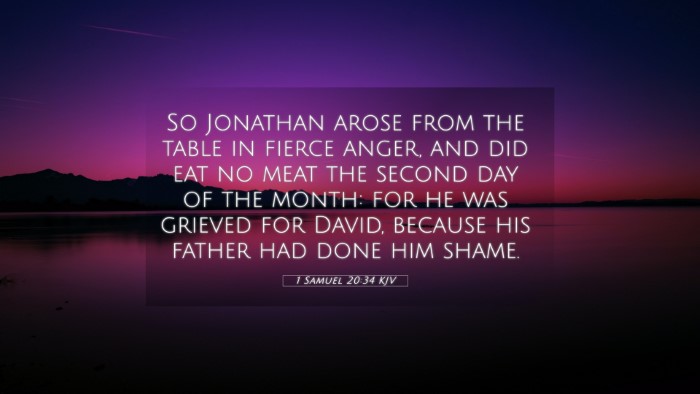Understanding 1 Samuel 20:34
Verse: "So Jonathan arose from the table in fierce anger, and did eat no meat the second day of the month: for he was grieved for David, because his father had done him shame."
Summary of 1 Samuel 20:34
This verse captures the emotional turmoil of Jonathan as he grapples with the conflict between his loyalty to his friend David and his obligations to his father, King Saul. Jonathan’s anger serves as an indication of the deep bond shared between him and David, as well as Saul’s hostility towards David.
Insights from Commentaries
Matthew Henry: Henry notes that Jonathan's strong reaction illustrates the intensity of his friendship with David and the depth of his disappointment with Saul's intentions. His refusal to eat symbolizes a sense of mourning over the betrayal and impending danger to David.
Albert Barnes: Barnes emphasizes Jonathan’s position as a mediator caught between two powerful figures—his father and his beloved friend. He illustrates how Jonathan's fierce anger exemplifies the struggle of loyalty and family ties in the face of righteous friendship.
Adam Clarke: Clarke points out the significance of the phrase “did eat no meat.” This could suggest not just physical fasting, but also a spiritual grief marking the gravitas of the situation concerning David. Jonathan’s actions reflect his moral conflict and concern for David’s safety.
Emotional Dynamics
1 Samuel 20:34 portrays the struggle within families when loyalty is tested by relationships outside the family, particularly regarding Jonathan's fierce loyalty to David. Jonathan's anger and grief not only highlight the severity of his feelings toward his father’s actions but also establish a poignant moment of selflessness as he chooses his friend’s welfare over familial allegiance.
Bible Verse Cross-References
- 1 Samuel 18:1-3: Discusses the covenant of friendship between Jonathan and David.
- 1 Samuel 19:1-2: Details Saul's intent to kill David and Jonathan's defiance of his father's maliciousness.
- Psalm 55:12-14: Reflects on betrayal by those close to us, akin to Jonathan’s dilemma.
- Proverbs 17:17: Highlights the nature of true friendship, relevant to Jonathan and David's bond.
- John 15:13: Jesus declares the ultimate love in friendship, parallel to Jonathan's devotion to David.
- 1 Samuel 20:30-31: Saul's anger toward Jonathan for defending David, the root of Jonathan’s conflict.
- Matthew 10:36: Jesus speaks of familial division, echoing Jonathan’s situation.
- 1 Samuel 23:17: Another instance of Jonathan supporting David, demonstrating his consistency in loyalty.
- Luke 6:22: Discusses the blessings and burdens of choosing a righteous path, similar to Jonathan’s choices.
- Galatians 1:10: Paul speaks of seeking approval, linking to Jonathan's need to navigate his relationships carefully.
Thematic Connections
The themes observed in 1 Samuel 20:34 resonate throughout Scripture, showcasing the complexities of loyalty, family, and friendship. It provides a vivid illustration of how personal relationships can be fraught with difficulty in light of larger moral issues.
Bible Cross-Reference Tools
To delve deeper into these themes, consider using:
- Bible Concordance: A valuable resource for locating verses based on keywords.
- Bible Cross-Reference Guide: An essential tool for those looking to study scripture contextually.
- Cross-reference Bible study: Methods to examine relationships between verses in greater depth.
- Comprehensive Bible cross-reference materials: Helpful for sermon preparation and thematic studies.
How to Use Bible Cross-References
Understanding Bible verse connections can enhance your study and comprehension of scripture.
- Identify keywords in the verses you want to explore.
- Use a Bible concordance to find verses related to your keywords.
- Look for thematic links and emotional undercurrents present in connected verses.
- Utilize cross-references to compare and contrast biblical themes across both the Old and New Testaments.
Through the lens of 1 Samuel 20:34, one can see the interconnectedness of biblical narratives and how personal relationships illuminate broader spiritual truths.





